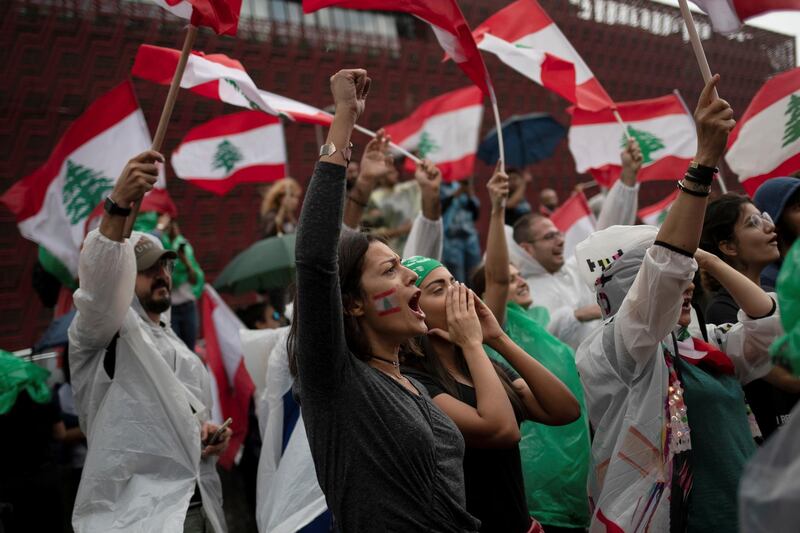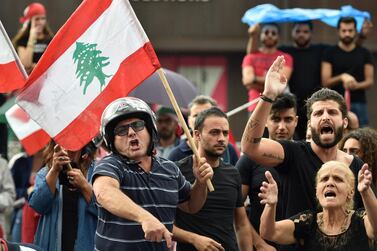The mass demonstrations sweeping Lebanon have hit a wall of resistance, with the political class mostly closing ranks and the Hezbollah-backed president giving no hint of major compromise.
In his first public appearance since the protests began eight days ago, President Michel Aoun suggested during a televised speech on Thursday a government reshuffle.
Sunni Prime Minister Saad Hariri, who has also ignored the street demands to quit, quickly endorsed the possibility.
It is a tactic that has been used across the Middle East in response to mass calls for change and for dignity, including during the uprisings of 2010-2011, but often to little effect.
Where the regimes or major elements associated with them have had a powerful outside sponsor, they have withstood the challenge from the masses.
In this regard, Lebanon is similar to Syria and Iraq in that Iran has shown its willingness to support its clients to the hilt.
Hezbollah leader Hassan Nasrallah predicted the demonstrations would not last long and hinted at sending in his militiamen, as he did in 2008 when the Cabinet sought to dismantle the Shiite group’s private communications network.
But today a large proportion of Shiites have joined the protests, directing their wrath more towards Nabih Berri, the Speaker of Parliament since 1992 and head of the Amal movement, Hezbollah’s main Shiite ally.
Mr Aoun, 84, allied with Hezbollah in 2006 in a move that led him to the presidency 10 years later, having reversed his enmity towards Syria’s ruling Assad family.
In his speech on Thursday, he recycled old pledges to combat corruption and hold anyone convicted of misconduct accountable.
He did not mention his son-in-law, Foreign Minister Gebran Bassil, a defender of Hezbollah abroad, who has been groomed to become president.
Mr Bassil at one point was head of the power ministry overseeing Lebanon’s disastrous electricity infrastructure, where tens of billions of dollars have been wasted or stolen since the 1990s.
The Maronite Christian minister has been whipping sectarian sentiment among his community as part of preparations to succeed Mr Aoun. But that may no longer be an effective strategy in Lebanon.
The protests have been cross-sectarian, drawing Lebanese from all backgrounds.
“Removal of all, means the removal of all,” has been a common slogan demonstrators have chanted across the small country of 6.1 million.
Prominent Lebanese economist Ishac Diwan said the country was undergoing a revolution aimed at shaping a new national identity by “individuals who reject the system”.
Leaders in Lebanon’s current confessional system can no longer escape being identified with corruption, having benefited from the state, the private sector, and dominated the credit resources, Mr Diwan told France Culture radio.
“This is the first time that this complete narrative of community representation is changing,” he said.
Mr Aoun’s speech was derided on the street in Beirut, stoking more of the abuse he and Mr Bassil have been receiving from Lebanese from all walks of life.
But the president showed political cunning, inviting the demonstrators to meet him while knowing that they lacked a leadership.
Lebanese political commentator Youssef Bazzi said it would be difficult at this stage for Lebanon’s protest movement to put together a manifesto, partly because of the depth of anger exploding on the street.
Instead of resigning, Mr Aoun adopted a provocative stance and sought to hijack the uprising by suggesting he should be given full power to conduct a purge, Mr Bazzi said.
Mr Bazzi said the axis of Hezbollah, Amal and Mr Aoun, and the backing of Iran, would make it difficult for the protest movement to change the system fundamentally in the short term, giving Syria and Iraq as examples.
"My own conviction is that the Arab uprisings will last for decades," he told The National. "Since 2011 they have been erupting in waves. As soon as one ends, another starts."
There has been no official comment from Iran on the upheaval in Lebanon. In Syria, Iran’s Islamic Revolutionary Guard Corps intervened directly to preserve Bashar Al Assad after Hezbollah could not bear the burden alone.
With Hezbollah in such a powerful position in terms of military capability, any role Iran plays will be much less apparent.







